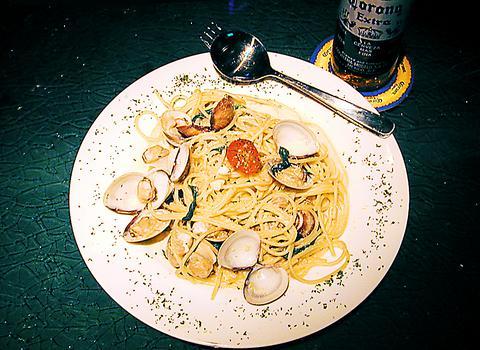Ling Wei (凌威) has built an empire within 10 city blocks. The owner of 99, Roxy Jr. and Roxy Vibe has opened his new flagship club, Roxy Wave, and hopes to continue the success of the brand name he's built over the past 22 years.
If anyone has a formula for success, it's Ling, who opened the first of his rock houses, AC/DC, in 1982, spurred on by fans of the popular radio rock music show he jockeyed.

PHOTO: TAIPEI TIMES
"People would call me at the station saying they wished there were a place in Taipei where they could hear the Doors and the Beatles and Van Morrison," Ling said. "So I opened AC/DC and I sold the records I played there. In the beginning we didn't even sell beer."
How times have changed. Beer has become such an integral part of the Roxy pubs that it's part of the floor plan at Wave. Designed in the shape of a woman with curvy neon lights outlining the dance floor, Wave has its DJ booth situated on the breasts and a circular bar where the womb would be. In the middle of the circle is a large tub filled with assorted bottles of brew. "Beer is our baby," Ling says with a laugh.
For the teetotal Ling, however, Roxy isn't so much about beer as about the music. And it's here where he separates his club (all his clubs) from a host of lounge bars that have settled into the Taipei area.
Ling plays the best of rock music throughout the week, often DJing himself, with an emphasis on what he refers to as "party music" on weekends. "Lounges are fine and light house music is fine, too. But after a while it' s boring," he said.
What Ling is ultimately striving for in having opened his fourth bar is to get back to where he started.
"I feel lost," he said. "I miss the original Roxy, the music that we played there and the people that came to listen to it. It was a great! I hope people come here wanting to hear great rock music with their friends. It's something this city needs more of."
On Wednesdays, men over 30 get in free and receive a free single malt Scotch. Ladies also get in free and receive a complimentary glass of wine. Coming early is recommended as Roxy Wave's menu is greatly expanded from the menu of 99 to include lamb chops with mint sauce, smoked salmon with capers, sirloin steak in a black pepper sauce and more.

In the March 9 edition of the Taipei Times a piece by Ninon Godefroy ran with the headine “The quiet, gentle rhythm of Taiwan.” It started with the line “Taiwan is a small, humble place. There is no Eiffel Tower, no pyramids — no singular attraction that draws the world’s attention.” I laughed out loud at that. This was out of no disrespect for the author or the piece, which made some interesting analogies and good points about how both Din Tai Fung’s and Taiwan Semiconductor Manufacturing Co’s (TSMC, 台積電) meticulous attention to detail and quality are not quite up to

April 21 to April 27 Hsieh Er’s (謝娥) political fortunes were rising fast after she got out of jail and joined the Chinese Nationalist Party (KMT) in December 1945. Not only did she hold key positions in various committees, she was elected the only woman on the Taipei City Council and headed to Nanjing in 1946 as the sole Taiwanese female representative to the National Constituent Assembly. With the support of first lady Soong May-ling (宋美齡), she started the Taipei Women’s Association and Taiwan Provincial Women’s Association, where she

Chinese Nationalist Party (KMT) Chairman Eric Chu (朱立倫) hatched a bold plan to charge forward and seize the initiative when he held a protest in front of the Taipei City Prosecutors’ Office. Though risky, because illegal, its success would help tackle at least six problems facing both himself and the KMT. What he did not see coming was Taipei Mayor Chiang Wan-an (將萬安) tripping him up out of the gate. In spite of Chu being the most consequential and successful KMT chairman since the early 2010s — arguably saving the party from financial ruin and restoring its electoral viability —

It is one of the more remarkable facts of Taiwan history that it was never occupied or claimed by any of the numerous kingdoms of southern China — Han or otherwise — that lay just across the water from it. None of their brilliant ministers ever discovered that Taiwan was a “core interest” of the state whose annexation was “inevitable.” As Paul Kua notes in an excellent monograph laying out how the Portuguese gave Taiwan the name “Formosa,” the first Europeans to express an interest in occupying Taiwan were the Spanish. Tonio Andrade in his seminal work, How Taiwan Became Chinese,